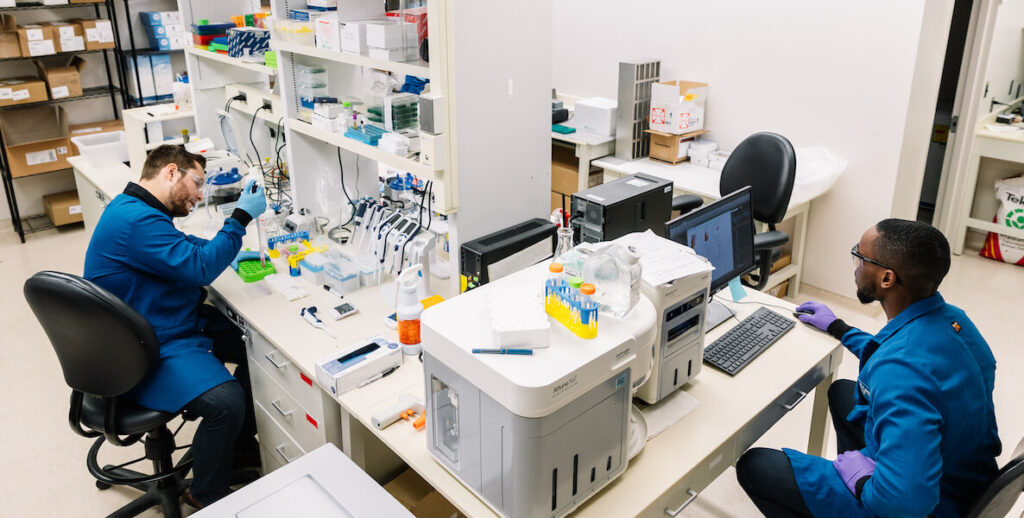The competition among states for science and technology-based innovations is intense. It’s no wonder. The life sciences, advanced manufacturing and high-tech sectors will drive the economies of tomorrow, creating the types of new jobs and career opportunities that top talent seeks.
That’s why states are working so hard — and investing so heavily — to build out entrepreneurial ecosystems that accelerate the economic and social benefits derived from disruptive and high-growth startups in rapidly evolving fields such as health care, renewables, agriculture, and energy, to name a few.
Nothing is wrong with a little competition, of course, nor with elected officials trying to position their states as leaders in emerging high-growth sectors. But much is lost when we refuse to recognize shared opportunities beyond our state, city or county lines and fail to embrace the good work of our neighbors.
Collaboration is at the heart of innovation. Look at most successful, high-growth, innovation-centric hubs such as in Cambridge and Silicon Valley. These hubs exist as a formal and informal partnership among leading research universities, business and industry, governmental leaders, and nonprofits — all pulling in a common direction to advance the next big idea.
The Greater Philadelphia area — and the Mid-Atlantic region more broadly — talk a lot about those examples of success. The key difference here, however, is that we must marry three states, dozens of cities, and a handful of counties to reach our full potential.
At a national level, there’s a push to regionalize certain government operations to enhance efficiencies, share services, and maximize the reach of limited resources. It’s a noble endeavor, and one that makes sense in many cases.
Look at most successful, high-growth, innovation-centric hubs such as in Cambridge and Silicon Valley. These hubs exist as a formal and informal partnership among leading research universities, business and industry, governmental leaders, and nonprofits — all pulling in a common direction to advance the next big idea.
Yet, when it comes to putting that same rationale behind efforts to regionalize economic development, especially in high-growth innovation-rich sectors, it’s usually a non-starter, especially in the Greater Philadelphia area.
That’s too bad. A broad approach to innovation can work, as we have seen at Delaware-based Innovation Space. In the five years since its inception in 2017, Innovation Space, located on the Experimental Station campus in Wilmington, has supported and enabled more than 80 startups in their growth journeys, which in turn has raised over $800 million in private capital and helped to create or retain more than 400 jobs.
This stretches well beyond the First State’s borders. In Pennsylvania, GeneLancet in Doylestown is using gene editing to work on cures for hepatitis B, HIV, cystic fibrosis and Alzheimer’s disease, and Media-based InveriTek is advancing high-throughput toxicology screening using freshwater planarians instead of rodents and other animals. In Glassboro, New Jersey, a Rowan spinout named Robossis creates surgical robots to align bone fractures.
More than 45 startups from around the world — Germany, Canada, and Uruguay — and across the country — Arkansas, California, Connecticut, Delaware, Florida, Illinois, Maryland, Massachusetts, Nevada, New Jersey, South Carolina, and Washington — have also cycled through the programs in the last two years.
Many of these states have their own highly competitive economic development programs, but entrepreneurs understand that building a business is about getting the best expertise no matter where it’s located. We should do the same, providing support where it’s needed, not only when it’s in our own backyard.
Virtual programs allow us to use technology to link scientists, business leaders, community members, investors, and service providers to help build business concepts and accelerate the path to commercialization of breakthrough innovations that will improve the human condition.
Our region is a competitive landscape for creative ideas and emerging business growth. One of the best and most significant tools in driving regional economic growth is to cultivate a strong relationship not just with entrepreneurs who might change the future, but as states, cities, and counties united with each other.
William D. Provine, Ph.D is the founder, President, and Chief Executive Officer of the Innovation Space in addition to a member of its Board of Directors. Prior to joining the Innovation Space, Bill worked for DuPont where he led global operations for science and engineering. Provine serves on the National Council for Innovation & Entrepreneurship and the American Association for the Advancement of Science.
The Citizen welcomes guest commentary from community members who stipulate to the best of their ability that it is fact-based and non-defamatory.

